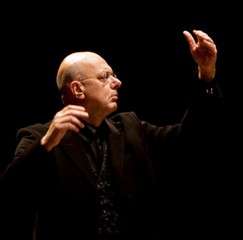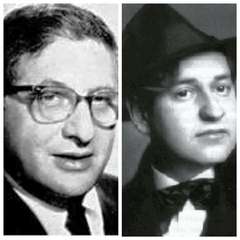|
Back
Korngold and Herrmann Ex camera New York
Isaac Stern Auditorium Carnegie Hall
11/03/2017 -
Bernard Herrmann: “Psycho” Suite for String Orchestra – Symphony No. 1
Erich Wolfgang Korngold: Symphony in F-sharp minor, opus 40
The Orchestra Now (TŌN), Leon Botstein, (Founder/Conductor)

L. Botstein (© Matt Dine)
“We can’t have music in the middle of the ocean,” said Alfred Hitchcock. “Where does the orchestra come from?” “The same place,” replied composer Hugo Friedhofer, “where the camera comes from.”
Discussion about incidental music for Hitchcock’s Lifeboat.
First a confession. I’ve enjoyed Leon Botstein’s concerts with The American Symphony Orchestra only partly for the music. The real reason is that Mr. Botstein’s essays are more than informative and incisive. Forget his encyclopedic knowledge or his experience as conductor. His genius in taking the most disparate elements in history–social, political, artistic–and transforming them into an enlightening essay is worthy not of a program annotator, but a latter-day Montaigne.
And like my colleague Roman Markowicz wrote some concerts ago, the replacement of these essays with cute introductions by the players in his The Orchestra Now (TŌN) are no replacement at all.
That said, Mr. Botstein did teach us a few lessons last night by performance of music by two of the greatest film composers in Hollywood history.
Both Bernard Herrmann and Erich Wolfgang Korngold were made for the business. Korngold, a wunderkind and serious composer in the Strauss/Mahler mold, always said that his movie incidental music was composed with the same conscientiousness as his operas and symphony. In fact, Warner Brothers’ Errol Flynn swashbucklers and Bette Davis weepies were manna for Korngold scherzos and adagios.
Bernard Herrmann might have joined the massive agglomeration of 1940’s-50’s American symphonists but found his artistic goldmine with Alfred Hitchcock (though his other film music is pretty impressive).
True, those two had their problems. Hitchcock didn’t want music for the shower scene in Psycho, but once Herrmann convinced him that the shrieking glissando violins were better than water, Hitchcock agreed. For their last aborted partnership, Torn Curtain, the producers and director insisted on a theme song which could be extracted to sell as a single record. Herrmann declined the assignment.
“I don’t write music for children,” he said.
Leon Botstein didn’t conduct music for children last night. He conducted TŌN in two symphonies and one film suite. And while none of this was perfect, one certainly learned from whence each composer had his genesis.
Psycho, with The Birds may be his most renowned American film (though I feel that Vertigo’s music and movie is an Everest above those classy molehills), but the Psycho suite, arranged by the composer, showed just where movie music has its limitations.
True, the one throbbing violin theme which comes after the frightening staccato chords is one of the great themes of film history. Yet after that, Mr. Botstein conducted one-minute excerpts which–outside of the film–had no point. Yes, the shower scene shrieking violins got the attention of the audience. Though I enjoyed visualizing its repeat, picturing Martin Balsam falling to his death down the stairs, the genius of Hitchcock’s camera zooming in and out.
The problem was not Bernard Herrmann or Mr. Botstein or the TŌN Orchestra. It was that each piece of music was written specifically for a spot in Psycho: the titles, the rainstorm, the murder, the swamp etc etc. Without the visuals, this movie Suite was like a concerto without a soloist. An accompaniment, nothing more. Blank, themeless, less gripping than blank, monochrome.
Following this was the “pure” pre-movie Bernard Herrmann, a symphony written before he was 30 years old and revised in 1973, two years before his death. As performed last night, it showed a fair four-movement construction, with an endless somber introduction (though he described it as Maestoso), a scherzo with some Valkyrie rhythms, and a finale that edged on American hoedown.
Mr. Herrmann’s natural bent for movie music was rarely apparent. Though (and I don’t mean this as an insult at all), parts of the final rondo could have served for some of the Republic Films Gene Autry cowboy pictures. Other than that, Mr. Herrmann seemed a far less impressive model of the David Diamond/William Schuman school. With no particular language of its own.
Another reason to be happy that he found his refuge in the arcane mysteries of Mr. Hitchcock.

B. Herrmann/E. W. Korngold
(© Bernardherrmann.org/Orelfoundation.org)
Erich Wolfgang Korngold’s single Symphony made up the second half, and was entirely different. Impressive, sharp, too conservative for its 1947 writing, but all in all, a pretty terrific piece.
Still, to requote Rossini’s famous quote on Wagner, “Korngold has wonderful moments but terrible quarters-of-an-hour”. Listen to Renée Fleming singing “Gluck, das mir verblieb” from Korngold’s Tote Stadt, and you hear music that can rival Rosenkavalier. Or the film music from Robin Hood, extraordinarily virtuosic, bold, daring, melodic, as brilliant in its own way as Star Wars 80 years later.
Parts of the Symphony sounded that way. The first movement had soaring brass calls which called to mind both Strauss’s Don Juan and the rollicking chases in Robin Hood. The elfin string sections in the scherzo were beautifully scored, and the finale, with its variations on a piccolo theme were a delight.
This was my first time hearing the complete work, and I frankly found the Adagio movement a catatonic stasis. Perhaps this was due to TŌN or a sluggish pace by Mr. Botstein or the fact that Korngold was hardly Brucknerian or whether a second hearing might remedy the problem.
I doubt whether it was TŌN, which took a work in a difficult key (F-sharp must be hell for the strings) with a huge percussion ensemble, and gave it a good taut reading.
Frankly, I’d rather hear some of his opera arias, and I’d rather see Errol Flynn and Olivia De Havilland in Captain Blood with Korngold’s great score. But Mr. Botstein gave us another lesson last night, that even ex camera (forgive the pun), both these composers were mighty in their own ways.
Harry Rolnick
|